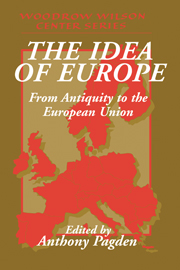Book contents
- Frontmatter
- Contents
- Acknowledgments
- Introduction
- 1 Europe: Conceptualizing a Continent
- 2 Some Europes in Their History
- 3 “Europe” in the Middle Ages
- 4 The Republican Mirror: The Dutch Idea of Europe
- 5 The Napoleonic Empire and the Europe of Nations
- 6 Homo Politicus and Homo Oeconomicus: The European Citizen According to Max Weber
- 7 The European Self: Rethinking an Attitude
- 8 European Nationalism and European Union
- 9 From the Ironies of Identity to the Identities of Irony
- 10 Muslims and European Identity: Can Europe Represent Islam?
- 11 The Long Road to Unity: The Contribution of Law to the Process of European Integration since 1945
- 12 The Euro, Economic Federalism, and the Question of National Sovereignty
- 13 Identity Politics and European Integration: The Case of Germany
- 14 Nationalisms in Spain: The Organization of Convivencia
- 15 The Kantian Idea of Europe: Critical and Cosmopolitan Perspectives
- Contributors
- Index
- Cambridge Cultural Social Studies
5 - The Napoleonic Empire and the Europe of Nations
Published online by Cambridge University Press: 14 July 2009
- Frontmatter
- Contents
- Acknowledgments
- Introduction
- 1 Europe: Conceptualizing a Continent
- 2 Some Europes in Their History
- 3 “Europe” in the Middle Ages
- 4 The Republican Mirror: The Dutch Idea of Europe
- 5 The Napoleonic Empire and the Europe of Nations
- 6 Homo Politicus and Homo Oeconomicus: The European Citizen According to Max Weber
- 7 The European Self: Rethinking an Attitude
- 8 European Nationalism and European Union
- 9 From the Ironies of Identity to the Identities of Irony
- 10 Muslims and European Identity: Can Europe Represent Islam?
- 11 The Long Road to Unity: The Contribution of Law to the Process of European Integration since 1945
- 12 The Euro, Economic Federalism, and the Question of National Sovereignty
- 13 Identity Politics and European Integration: The Case of Germany
- 14 Nationalisms in Spain: The Organization of Convivencia
- 15 The Kantian Idea of Europe: Critical and Cosmopolitan Perspectives
- Contributors
- Index
- Cambridge Cultural Social Studies
Summary
Or che regna fra le genti
La più placida armonia
Dell'Europa sempre fia
Il destin felice appien
In 1824 the Italian musician Gioacchino Rossini, who was at the time at the height of his reputation, living in golden retirement in Paris, was commissioned to write an opera celebrating the coronation of King Charles X, the former Comte d'Artois, youngest brother of the unfortunate Louis XVI. Rossini obliged: the opera was called Il Viaggio a Reims (The Journey to Reims); it was performed a few times—apparently with success—in the presence of the royal family, but then, judging it unsuitable for ordinary theatrical repertoire, the author withdrew it, using the score for his popular opera buffa Le Comte Ory.
The plot of Il Viaggio a Reims is quite thin: a group of travelers of different nationalities, on their way to Reims to assist in the ceremony of the coronation, meet in the spa town of Plombières; marooned in a local auberge by a series of mishaps and unable to pursue their journey, they decide to celebrate the event on the spot with a banquet and a musical performance. Each character in the opera impersonates rather comically a national stereotype: a French countess is a fashion-mad flirt, a Spanish nobleman clicks his heels and breaks into flamencos, a German baron is called Trombonok and appears on stage with the accompaniment of a military brass band, and so on.
- Type
- Chapter
- Information
- The Idea of EuropeFrom Antiquity to the European Union, pp. 116 - 128Publisher: Cambridge University PressPrint publication year: 2002
- 15
- Cited by



